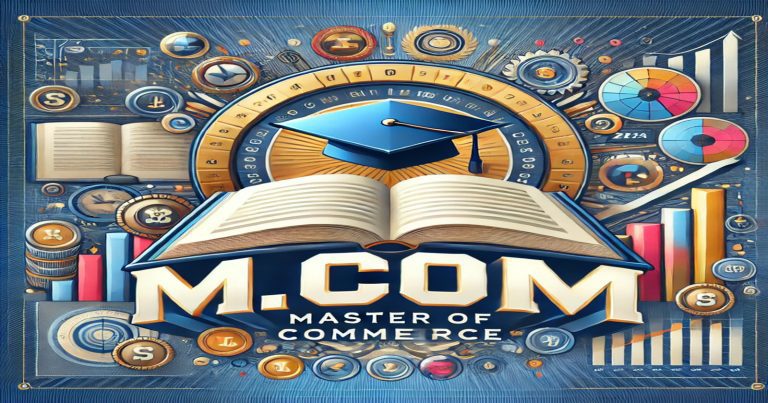M Com stands for Master of Commerce, advanced commerce, accounting, management, and even economics. This course widens the scope of developing a career in finance, business, or accounting. It is offered for those interested in pursuing higher studies, such as a Ph.D., after completing this course. It covers two years and makes a person aware of the different aspects of commerce. When people ask, “Can I do MCom after BCom?” The answer is yes! MCom becomes a logical thing to do, especially after completing a Bachelor of
MCom Course Details
The MCom is one of the prominent courses offered to commerce students to enhance their knowledge of advanced accounting, finance, and business management. It is a result-based program that caters to the need for both the theory and application skills of accounting.
Key Features of MCom Programs
MCom’s short form is Master in Commerce which means it relates to advanced studies about commerce and allied subjects. Some of the major highlights are given below, which apply to the above course:
| Aspect | Details |
| MCom Course Duration | 2 years (divided into 4 semesters) |
| Eligibility | A Bachelor’s degree in Commerce or a related field |
| Specializations | Finance, Accounting, Marketing, Taxation, and more |
| MCom Jobs | Accountant, Financial Analyst, Tax Consultant, Banking Professional, etc. |
| MCom Salary | Starting at ₹3-6 LPA, with growth potential based on experience |
The program includes essential MCom subjects such as accounting principles, business laws, financial management, and economics.
Why Do I Study an MCom Course?
Why do I choose an MCom when I have so many other postgraduate courses available to me?
It is the same question students raise often. With a large number of advantages provided, MCom has been quite popular among all commerce graduates, and this article discusses all these benefits, especially related to advancing in careers with such courses, besides skills building.
MCom degree equips the student with advanced skills in commerce and management. It develops expertise in taxation, banking, and corporate finance. MCom students of India get insights into the Indian financial market and global economic trends.
- Higher Earning Potential: Graduates with an MCom degree can expect higher remuneration in comparison to that of BCom graduates. MCom graduates average starting salary can range from ₹3-6 LPA. However, their salary increases manifolds when they gain experience.
- Further Study Opportunities: The next academic course MCom will also serve as an excellent stepping stone for pursuing further academic interests like a Ph.D. in Commerce or the Chartered Accountancy (CA) qualification. CA + MCom may boost your prospects on the job, making you an extremely prized professional.
MCom Course Eligibility Criteria
To apply to an MCom course, you need to meet some eligibility criteria. The criteria determine that students must possess the basic knowledge for advanced studies. Eligibility Criterion of MCom
- Academic Qualification: He must hold a degree of Bachelor of Commerce (BCom) or equivalent degree like BBA or BA in Economics.
- Percentage: In most of the institutes, the aggregate marks at the UG level are required to be a minimum of 50-60%.
- Entrance Exams: Some colleges conduct entrance tests like DUET or CUET for admission to their MCom courses.
If you are asking, Can I do MCom after BCom? The answer is a big yes. BCom graduates constitute the majority of MCom applicants.
MCom Admission 2025
Admissions to the MCom course in 2025 will be merit-based and will be done through a structured application process. A lot of students apply for MCom courses, which indicates that each student has to be detailed concerning deadlines and requirements for procuring a seat. Admission Process is as follows:-
- Application Submission: Fill up application forms for your concerned universities.
- Entrance Exam: Take entrance exams such as the MCom course entrance exam 2025, which may include tests like DUET or CUET.
- Merit-Based Selection: Some universities take students based on undergraduate marks.
The top universities which offer MCom programs are Delhi University, Banaras Hindu University, and Mumbai University.
Types of MCom Programs
The MCom program caters to various forms of delivery to suit every kind of student. Whether a full-time student or a working professional, an option exists for everyone. Full-Time, Part-Time, and Distance Learning
- Full-Time MCom: Full-time is the most common type that will necessitate two years on campus
- Part-Time MCom: This is perfect for working professionals because it offers flexible hours.
- MCom Distance Education: It is ideal for students who cannot attend regular classes, just like IGNOU’s distance learning MCom.
Each of them has their advantages. For instance, in MCom distance education, one can balance his work and study.
M com Syllabus
The MCom syllabus is designed to enhance students’ expertise in commerce, finance, and business management. It develops critical thinking, analytical skills, statistical knowledge, business acumen, and teaching abilities. This curriculum is ideal for students who wish to pursue advanced research (Ph.D.) or serve as professors, lecturers, or industry experts. The program is spread over two years, with an emphasis on two different aspects of commerce. The first year consists of basic subjects like finance, accounting, and business processes. The second year consists of advanced topics like banking, taxation, and strategic finance, after which research and internships prepare students for practical applications.
MCom 1st Year Subjects
The first year forms a basic commerce, finance, and management basis. It discusses core subjects needed to understand other advanced topics within the second year.
M com Sem 1 Subjects
- Org Behavior and Mgt Process: This is human behavior in the organization; a study of the factors that lead individuals to become involved in organizations in the first place, including teamwork dynamics, motivation, and leadership in the process of management of organizations for efficiency of business.
- Computer Applications in Commerce: The Computer Applications in Commerce course exposes learners to software and IT tools applicable to commerce, including Excel, Tally, and data analysis, making a student more technologically competent.
- Business Environment & Policy: Students are exposed to factors affecting businesses external and internal. Ibusinessesomic policies, globalization, and sustainability. It improves the analysis of a wider business landscape.
- Marketing Management: Marketing Management topics include understanding consumer behavior, market research, and branding. The subject develops the skills of marketing and communication effectively.
M com Sem 2 Subjects
- Management and Financial Accounting: Management and Financial Accounting This subject involves the preparation and analysis of financial statements. Students learn how to manage costs, prepare a budget, and apply accounting techniques for guidance in financial decisions.
- Managerial Economics: This subject explores the theories of economics and applies them to decision-making processes in businesses, mainly on-demand analysis, market structure, and pricing.
- Management of Nonprofit Organizations: Students learn the specific issues of managing nonprofit organizations, such as fundraising, resource allocation, and community engagement.
- Research Methods: This course introduces research design, data collection, and statistical analysis methods, which are the foundation for academic and professional research.
MCom 2nd Year Subjects
The second year is specialized and applied knowledge in areas like taxation, mergers, e-commerce, and research-based projects.
M com Sem 3 Subjects
- Financial Management: Financial Management This course teaches students the techniques for effective financial planning, investment decisions, and risk management. It helps maximize organizational profitability.
- Managerial Communication: This course enhances communication skills in management, including report writing, public speaking, and negotiation, which help students thrive in leadership positions.
- Management of Financial Services: This course includes banking, insurance, and capital markets. It introduces students to the numerous options for investments and the financial institution’s contribution towards economic development.
- International Trade – Theory & Practice: The theories, policies, and practices of international trade are taught in this course. In addition, the procedures for exports and imports, agreements related to trade, and international trade dynamics are discussed.
M com Sem 4 Subjects
- Elements of Income Tax: This course covers the tax structures, income tax calculations, and legal tax frameworks applicable in India.
- Mergers & Acquisitions: This course discusses the strategic and financial considerations involved in mergers and acquisitions. Students learn the techniques of valuation and deal structuring.
- E-Commerce: E-Commerce This is a subject related to online business models, digital marketing, and payment gateways. It readies students for the management of businesses in the digital era.
- Internships and Research: The MCom program finally takes the form of internships and research projects to give practical experience and expertise in subjects of interest.
Core and Elective Subjects in MCom
The MCom syllabus is student career objective-friendly. The core subjects are the foundation areas, and the electives have scope for diversification into various branches of commerce.
MCom Specializations
The MCom specializations help students pursue a special focus in areas of commerce according to their specific interests and requirements in their future careers. Different specializations help highlight unique MCom Specializations The MCom specializations guide students to focus on special interest areas in the field of commerce, which can be their career interests or future needs. Specializations focus on unique features of the business world. They establish a specialized field area, which has considerable industry demand. Best MCom Specializations are:-
Finance
Finance specializes in investment analysis, portfolio management, risk assessment, and strategies for corporate finance. Graduates are geared towards working in financial models and decision-making processes, thus enhancing the skills of banking, financial consultancy, and investment firms.
Marketing
Marketing This field of study encompasses consumer behavior, brand management, advertising, and the practice of market research. This area of study equips students with the potential to be successful in marketing strategy, digital marketing, product management, as well as sales, along with their capacity to create influential marketing campaigns.
Taxation
Taxation provides a complete understanding of all tax laws with compliance. The students here are taught different kinds of tax such as Direct and indirect ones like income, GST, or corporate tax as a tax consultant or auditor job requires it deeply.
Accounting
Accounting specialization includes more advanced topics such as financial reporting, auditing, and cost analysis. The skills acquired help maintain and analyze financial records, making students highly valuable for positions in public accounting, auditing, and corporate finance. assets of the business world. They build an expertise area, which has significant demand within the industry.
MCom Course Comparison
MCom is one of the most in-demand postgraduate programs in commerce; however, often students tend to compare it with other courses in the same group, such as MBA, MF, and MPA. Unique features, career opportunities, and expenditure characterize these courses. By comparing these options, students can make decisions regarding the ideal course suited for their interests and purpose. MCom vs. Other Commerce PG Courses
Below is a comparison table of MCom with MBA, Master of Finance (MF), and Master of Professional Accounting (MPA) in terms of some aspects::
| Aspect | MCom | MBA (Commerce Focus) | Master of Finance (MF) | Master of Professional Accounting (MPA) |
| Focus | Commerce, Accounting, and Finance | Business Administration and Strategy | Advanced Financial Analysis | Professional Accounting Practices |
| Course Duration | 2 years | 2 years | 1-2 years | 1-2 years |
| Eligibility | BCom or equivalent | Any Bachelor’s Degree | Bachelor’s in Commerce, Finance, or related | Bachelor’s in Commerce or Accounting |
| Core Subjects | Financial Management, Taxation, Marketing | Strategy, Leadership, Financial Planning | Investment Banking, Risk Management | Auditing, Advanced Accounting, Taxation |
| Job Roles | Accountant, Financial Analyst, Tax Consultant | Manager, Consultant, Entrepreneur | Investment Analyst, Financial Planner | Auditor, Forensic Accountant, Compliance Officer |
| Industry Focus | Commerce and Finance Industries | All Industries | Banking, Capital Markets | Public Accounting, Corporate Finance |
| Cost | Low to Moderate | High | Moderate to High | Moderate to High |
| Salary Potential | ₹3-6 LPA (Entry Level) | ₹5-10 LPA (Entry Level) | ₹6-12 LPA (Entry Level) | ₹5-10 LPA (Entry Level) |
MCom Distance Education
MCom through distance education is an excellent opportunity for those students who, for some reason or other, cannot attend regular classes either due to the constraints of a job, locality, or otherwise. Acquiring a degree from a reputed institution allows higher education with no compromise over other responsibilities.
Features of Distance Learning Courses
- Low Fee Structure: More economical, programs of distance education like IGNOU’s MCom are. The courses thus reach a broader student population that would otherwise be out of their reach. Since the fees charged are much less than the conventional campus businesses, it suits financially weak students.
- Flexibility: A student learns to study at his/her own pace while undertaking distance learning since it suits balancing work, family, or other obligations. At times, course material might be readily available online or even in study centers, which enables students to take up lessons at their convenience and schedule.
- Recognition: The degrees obtained from renowned distance learning universities like IGNOU or Annamalai University are at par with any other regular degree. They are accepted by employers and bodies for further studies.
- Accessibility: Distance learning is very useful for students who live in remote areas or those who cannot shift to another place for higher education. Online resources, virtual classes, and study materials allow access to quality education from anywhere.
Distance education programs suit working professionals and students seeking a cost-effective, flexible, and recognized mode of completing their MCom course with the right balance of personal and professional life. IGNOU, Sikkim Manipal University, and the University of Mumbai offer excellent distance MCom programs.
MCom Career Opportunities
MCom is an open gateway to booming careers in the areas of banking, finance, taxation, and consultancy in various industries. The degree allows access to more knowledge concerning accounting, financial management, and business practices. A graduate can work on both public and private sides to secure a promising and stable lucrative career progression. Top Careers After MCom are:-
Accountant
Accountants are very important to maintain financial records, present statements, and ensure that an organization will comply with regulatory standards. Corporate and public accounting firms require MCom graduates to be in the auditing, budgeting, and cost management realm.
Financial Analyst
A financial analyst reviews financial data and market trends with a company’s performance to make investment recommendations. MCom graduates have the analytical and technical skills needed to assist organizations in making profitable financial decisions.
Tax Consultant
A tax consultant is an advisor who assists individuals or firms in planning their taxes and compliance. In such a role, they apply the knowledge of tax laws acquired upon the completion of an MCom to minimize tax liability within the limits of the law.
Banking Professional
MCom graduates can be recruited as credit analysts, relationship managers, or loan officers in banking. Their knowledge of financial services, risk management, and customer relations makes them the best candidates for these positions in both private and public sector banks.
Scope of M Com
The scope of MCom is extremely wide in terms of various opportunities in areas like corporate finance, education, consultancy services, and government jobs. It will also provide foundational qualifications for further professional qualification in CA, CMA, and CFA and propel career advancement. The salary grades for MCom will be steady and high, coupled with job security.
M com FAQs
1. What is MCom’s full form?
MCom full form stands for Master of Commerce, it is a postgraduate degree in commerce and management.
2. Can I do MCom after BCom?
Yes, you can pursue an MCom after completing a BCom. It is the most common pathway for commerce graduates.
3. What is the average MCom salary in India?
The average starting MCom salary in India varies between ₹3-6 LPA, as per the position and industry.
4. What are the major MCom subjects?
Major subjects include Financial Management, Managerial Accounting, and Business Law. Some electives are Taxation and International Business.
5. Is MCom distance education worth it?
Yes, because it is a course that is very helpful for students who seek flexibility. Like IGNOU’s MCom, the course is very high quality and with affordable fees.


